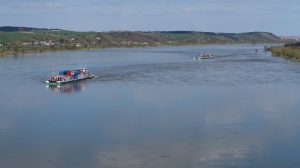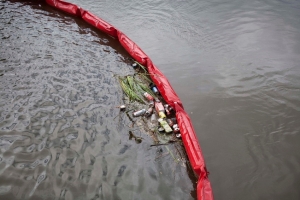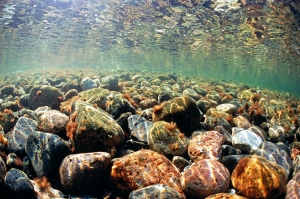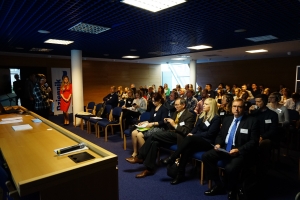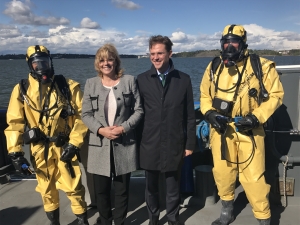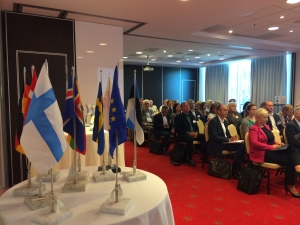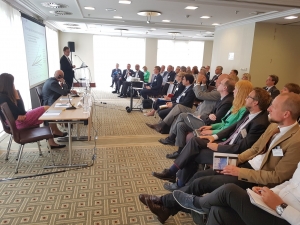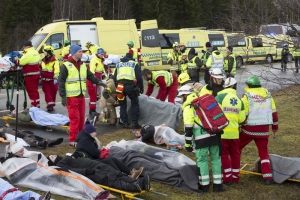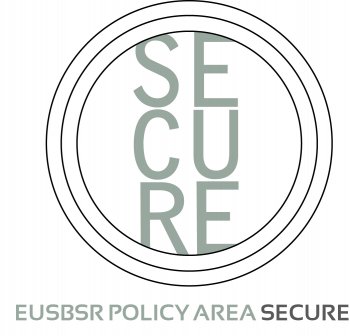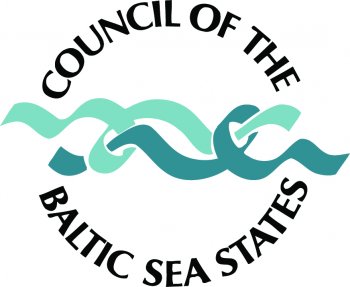EUSBSR Flagship EMMA boosts inland navigation in the Baltic Sea Region
EMMA is a Flagship of the EU Strategy for the Baltic Sea Region aiming to enhance freight mobility and logistics by strengthening inland waterway and river-sea transport and by promoting new international shipping services. The container barge pilots in Poland and Sweden are noticeable examples of its outcomes so far.
For a litter free Baltic Sea
The BLASTIC project, an EUSBSR Flagship under Policy Area Hazards, aims to reduce plastic waste and, thereby, the inflow of hazardous substances into the Baltic Sea by mapping and monitoring the amounts of litter in the aquatic environment.
Spotlight on Policy Area Nutri: In search of effectiveness - Boosting projects reducing eutrophication & mobilising citizens to protect the sea
EUSBSR Flaghip project NutriTrade mixes activities to implement practical measures and to develop longer-term solutions to combat eutrophication. In particular, its digital crowdfunding platform Nutribute may prove to multiply the impact of the flagship over the time. Nutribute facilitates encountering of Baltic Sea savers and can be used as a fundraising tool for concrete measures to reduce eutrophication. In other words, Nutribute harnesses digital technology to contribute towards cleaning the Baltic Sea and thus contributes to the EUSBSR ‘Save the Sea’ objective.
Business involvement in EUSBSR needed to make a lasting difference
On 8th November 2017, in the Maritime Culture Centre in Gdańsk, Poland, an international seminar entitled “How Can Maritime Business Benefit from the EU Strategy for the Baltic Sea Region?” was held. It was organized as part of “Let’s Communicate!” and “Smart Blue Regions” projects by “Pomorskie in the EU” Association, PA Ship and PA Safe. During the seminar, experts and companies from the maritime industry met to discuss current and potential maritime projects (covering the fields of shipping industry cooperation, logistics, port industry, shipping and occupational safety, biotechnological innovations, etc.)
EUSBSR Flagship status – what does it mean for a project?
In October 2017, three new Flagships of Policy Area Secure were adopted by the EUSBSR National Coordinators. The actions of the EU Strategy for the Baltic Sea Region are implemented by means of Flagships. Flagships demonstrate the progress of the Strategy, and may serve as pilot examples for desired action in a given field.
We asked the newly approved Flagships what the status means to them.
EUSBSR Flagship ChemSAR saves human lives
ChemSAR project is an EUSBSR Flagship aiming to no less than save human lives. Human lives will be saved by improving the efficiency of the rescue operations at sea. The rescue operations will become more effective with the help of standard operational procedures which the project creates, especially to be used in hazardous and noxious substances incidents.
DIGINNO project speeding up Baltic Sea region digital single market
A digital Flagship of Policy Area Innovation, project DIGINNO (Digital Innovation Network), was launched on 5 September in Tallinn. DIGINNO’s objective is to advance the digital economy and to speed up the process of moving towards the Baltic Sea region single digital market. The project aims to increase the capacity of policymakers, industry associations and industrial SMEs to enable faster and more efficient uptake of digital solutions both in public and private sector.
Spotlight on Policy Area Health: improving and promoting health of people in the Baltic Sea Region
Healthy Population – Prosperous Region
A healthy population is a critical factor behind the sustainable economic development of enterprises and societies. Therefore, improvement of health throughout the Baltic Sea region is important for the prosperity of the region.
Spotlight on Policy Areas Ship & Safe: Future of Maritime Safety & Security and Clean Shipping in the Baltic Sea Region
Politicians, public authorities, industry stakeholders and maritime Flagship Projects agree that there is a need to focus on cross-sectorial cooperation, education and training as well as enforcement of regulations in order to turn the Baltic Sea Region into a leading region for clean and safe shipping.
Spotlight on Policy Area Secure: Civil Protection + Law Enforcement = Safer Baltic Sea Region
|
||||
|
Connect with PA Secure: www.bsr-secure.eu Facebook/Twitter: @BSRSecure |
||||
|
Who we are Since the inclusion of the former Priority Area Crime into the Policy Area Secure in 2015, our team had been striving to act in a holistic societal security paradigm that focuses on risk reduction management related to all threats, regardless whether their origins are natural disasters, man-made disasters or organised crime. We believe that the common efforts of the Baltic Sea Region countries within our Policy Area save lives prevent economic losses and contribute to making the region safer and more prosperous for people to live in. Within PA Secure we organize the activities around two interconnected pillars: civil protection and law enforcement, taking into account that the human dimension of security is as important as the establishment of efficient institutional mechanisms to tackle emergencies.
|
||||
|
What we do As coordinators, we believe in connecting people, networks and organisations facing common challenges. Common challenges became joint opportunities if we face them together. We strive for building long-lasting professional relationships and creating a common security culture in the region. Our working days are filled with a lot of contacts with professionals: we are calling people, mailing people, providing them with a platform for a dialogue. It is already an achievement to have a group of civil protection or law enforcement experts from all the countries in the region to sit around one table. But in order to achieve what they set out to do they might need extra resources, be it carrying out academic research or funding. That is where we come in again identifying needs and relevant funding sources for a project, or a university with a particular research programme. We facilitate different initiatives for new projects, our organisations can even participate in some of them as partners. (There are 10 EUSBSR Flagship projects under Policy Area Secure). We also make sure that the lessons learned from the projects, research results and expert opinions are shared as widely as possible and conveyed to the policy makers. |
||||
|
What is new? For more comprehensive list of PA Secure news, events and activities read our newsletter. Below are some highlights from the recent developments in all 4 areas of our action plan:
“From Gaps to Caps” project finalised. The 24 months long flagship project within the EU Strategy for the Baltic Sea Region; From Gaps to Caps – Risk Management Capability Based on Gaps Identification in the Baltic Sea Regions, has just been finalized. The final report is available here. From Gaps to Caps contributed to strengthening the macro-regional capacities for risk assessment and the establishment of efficient crisis management schemes to cope with natural and manmade disasters in the Baltic Sea Region.
Cross-sectorial project - community resilience to climate change. With the financial support from the Swedish Institute, HA Climate and PA Secure have been leading a consortium to develop a project concept to improve the resilience of urban communities, related to climate change risks, threats and challenges. The resulting project (CASCADE: Community Safety Action for Supporting Climate Adaptation and Development, led by the Union of the Baltic Cities (UBC)) will bring together climate change adaptation and civil protection specialists from different countries in BSR to increase risk assessment cooperation between the national and the local levels. The UN Sendai Framework for Disaster Risk Reduction is one of the cornerstones in the upcoming project.
The CBSS Task Force against Trafficking in Human Beings (TF-THB) partnered in a new project called Trafficking along Migration Routes (TRAM): Identification and Integration of Victims of Trafficking among Vulnerable Groups and Unaccompanied Children (2017-2018). It is coordinated by the International Centre for Migration Policy Development (ICMPD) and funded by the Asylum, Migration and Integration Fund of the European Union.
The project Joint Approach to Tackle Organised Cross-border Crime in the Baltic Sea Region (JATOC) will set up a conceptual model for the joint regional analysis and encourage best practices of national Criminal Intelligence Systems between the participating member states law enforcement agencies to define common guidelines for further cooperation to tackle organised crime in the Baltic Sea Region. The project aims to create more synergy between the Baltic Sea Region Border Control Cooperation and the Baltic Sea Task Force on Organised Crime as well as with the EU Policy Cycle on shared activities and actions relating to cross border crime. Where do we want to be? In the near future we plan to:
Contacts: Civil Security team, Council of the Baltic Sea States Secretariat Janusz Gąciarz, Senior Adviser on Civil Security, This email address is being protected from spambots. You need JavaScript enabled to view it. Jacek Paszkowski, Adviser for Policy Area Secure, This email address is being protected from spambots. You need JavaScript enabled to view it. Nina Jernberg, Project Assistant, Civil Security, This email address is being protected from spambots. You need JavaScript enabled to view it. Andriy Martynenko, Project Officer, This email address is being protected from spambots. You need JavaScript enabled to view it. Swedish Civil Contingencies Agency (MSB) Julia Fredriksson, Adviser on EU and International Issues, This email address is being protected from spambots. You need JavaScript enabled to view it. Spotlight blog series introduces the concrete work done by the Policy Areas and Horizontal Actions of the EU Strategy for the Baltic Sea Region. |




